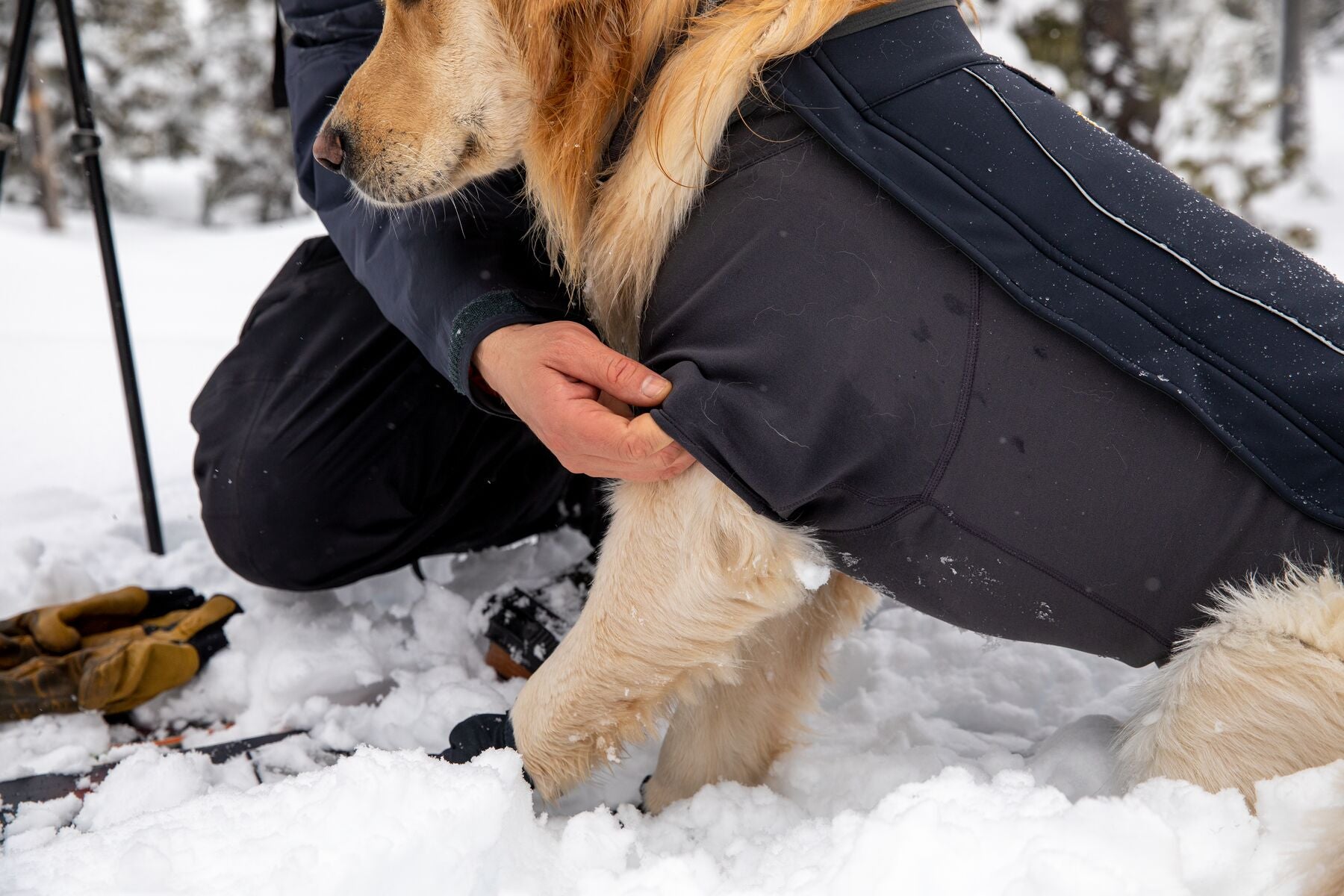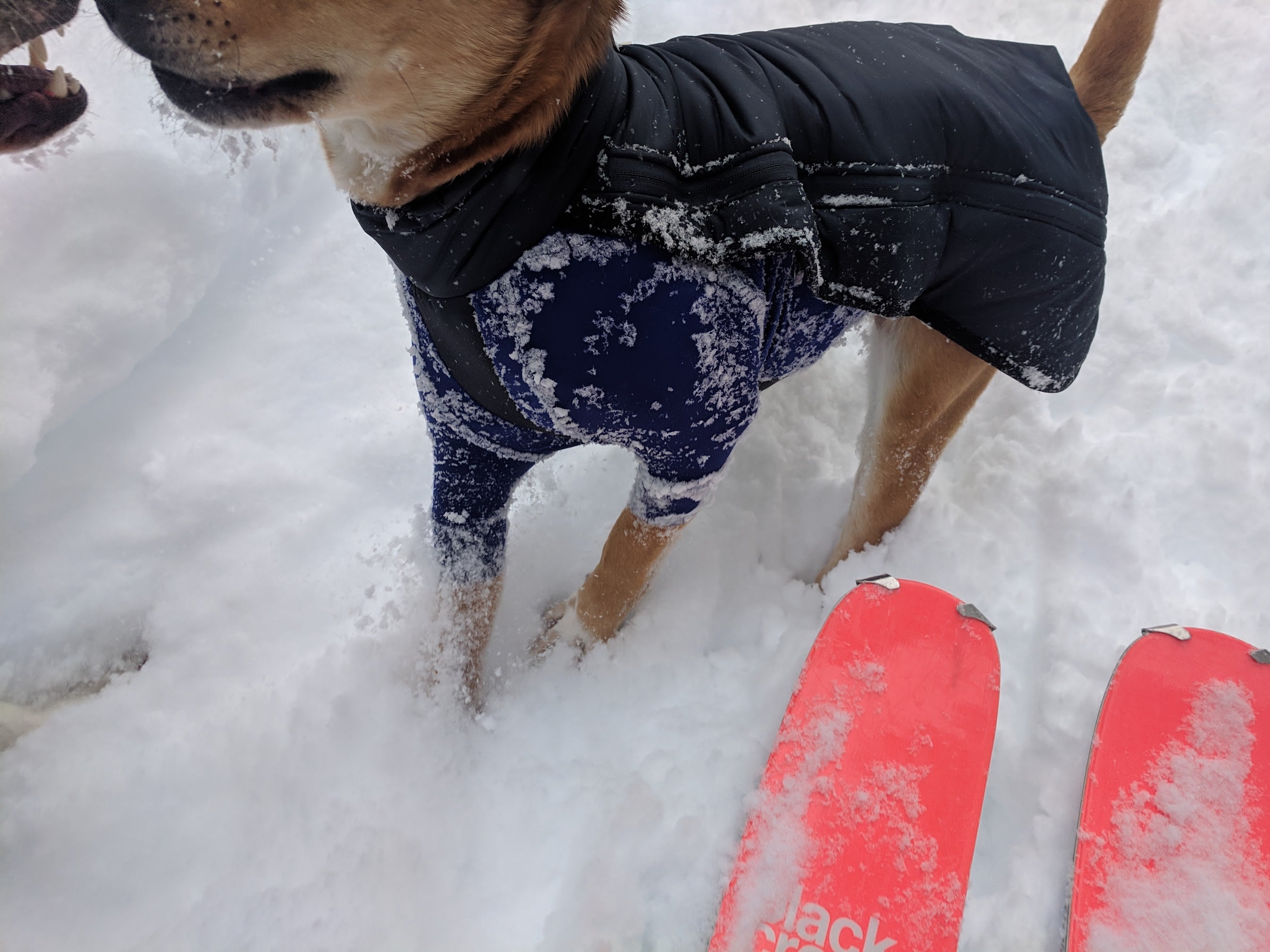DIG: Behind the Design of the StormSleeves™
Welcome to our first D.I.G. (Design, Innovation & Gear) story of the year, where we dig into our latest innovation in the world of canine apparel: the StormSleeve™.
We design to solve problems, meet needs, and truly enhance your and your dog’s outdoor endeavors. And, we design to do so without distracting dogs from their task at hand: unleashing their inner explorers.
How can we support canines on their cold-weather adventures with high-performance warmth without sacrificing comfort and mobility?
This is where the story starts for our latest innovation in canine winter apparel: the StormSleeve™.

PUT A SLEEVE ON IT
Sleeves – and apparel in general, for that matter – are very human things. They pose a unique creative challenge when translating them to a canine form, let alone one that comes in a myriad of shapes and sizes, and one that can dash and bound in an impressively athletic fashion.
It’s a creative challenge that the Ruffwear designers are constantly facing. “That’s the tricky thing, designing for dogs. When you’re designing a product for snow for humans, there are so many high performance products out there, and they don’t have to engineer this insane amount of range of motion for them like you do for a dog. The things most humans would wear to barrel through the snow – those materials and construction are often super stiff and just wouldn’t work for a dog.”
That’s Monica Welcker, lead designer on the Furness™ Jacket – one of our jackets that features the all-new StormSleeve™.
“One of the inspirations for the [Furness] project starting was because of [my dog] Giles (picture below) being cold all the time. And while we started with wanting to build our new warmest jacket, we started talking as a team about snowballs and these other issues some dogs have with sleeves, as well. We saw there was an opportunity for a new problem to solve.”

Sleeves first showed up on a Ruffwear jacket in 1998. And while the sleeves on that first Cloud Chaser™ might look similar to today’s, they’ve been consistently tweaked and refined over the years, striking that balance of coverage for warmth while fitting (and moving with) the arms of most types of dogs.

Ruffwear's Founder, Patrick Kruse, has been there for every iteration. “It’s YEARS of refinement. Literally. Looking at how big the opening needs to be, figuring out seams, figuring out patterns to make sure stitching isn’t hitting in different places.
You’d think it would be, ‘Put a sleeve on it,’ and it would be simple. But we can’t anthropomorphize our dogs when we create patterns. We have to start from scratch. It’s not as easy as you think.
While the current sleeve works for a big majority of dogs, we saw an opportunity to take a big leap and offer another solution.”
TIME TO INNOVATE
The brief: design a sleeve with more coverage for more warmth and protection from the elements. One that will also seal out snow and ice, a challenge Monica knew all too well with her other dog, Alta (picture below). With skinny legs and short hair, Alta often saw ice and snow build up and irritate under her sleeves when out in deeper in snow.

To design this sleeve specifically for the snow, the team first drew inspiration from their own ski jackets with powder skirts and puffy jackets with spandex cuffs in the sleeves.
They created a prototype, and hit the trails. “And then we realized that this is just not gonna work. The way that construction interacts with humans is different than where it would be on a dog, and not a ton of range of motion like a dog would need.”
Back to the drawing board.

Each iteration held a lesson to be learned – making headway on one part of the problem (weather resistance) but hitting a wall with fit and freedom of movement for the dog. Or, solving for movement, only to find the material struggling in the very conditions we needed it to perform in.
And, of course, Alta and Giles were available every step of the way to put each iteration to the test.

It was a new fabric discovered by the team that started to pick up the momentum behind the iterations of the new design. They began to explore what was possible with this thinner and stretchier material.
Monica recounts the aha! moment for the team.
"We’re all looking at this first material with a fleece backing on it, and we couldn’t achieve the stretch that we wanted in order for the sleeve's cuff to stay sealed.
Did we need the fleece backing? What if we did this new material with double layers so it has the same amount of warmth but a lot more stretch so it works for both skinny dog legs and muscular dog legs?"
A few not-quite-right prototypes followed, but with the new stretch material performing well in the snow, they knew they were on the right track. It was the patterning that still needed fine-tuning – which is par for the course when working with dog apparel built to be moved in.

Patterning is part art, part science, and entirely a familiar challenge for Patrick. "Just like on human gear, when seams coming together in the wrong place, it's just really annoying. We try to bring seams away from those areas that are not comfortable. It’s about patterning, it’s about fit, it’s about thoughtful design and orienting the seems for the stretch to move with the dog rather than work against them."
And armed with a pair of scissors and stack of paper, Monica set to work. "We had a lot of history to work off of with our existing sleeve. I knew we wanted to do this folded over tube, but it needed more shape for it to fit a dog. I split it into a few panels, and things began to take shape."

The other key part of the sleeve's construction was moving away from a top-stitched hem around the circumference of the sleeve, which limits it stretch to what the seam allows.
For designer Colin Tisdale, who incorporated the new StormSleeve™ into the new design for our other snow-loving jacket, the Powder Hound™, the longer, tapered sleeve with a vertical seam was the sweet spot they were going for.
"Finishing it with stitching on the hem would keep the opening from stretching, which isn't what we were going for with this particular jacket. We wanted a seal around the arm, so by stitching vertically, you get a lot of stretch around the circumference of the cuff. It moves with the dog better, and having a longer and more tapered sleeve allows the whole sleeve to move and stretch with the leg."

A team of designers, a deep pool of lessons learned over the years to draw on, and countless hours of wear testing by dogs out on the trails to really put our theories through their paces – it all came together to make the sleeve you see on the Furness™ and Powder Hound™ today.
All that for a sleeve?
Yep, all that for a sleeve. Because while innovation and discovery are the rewards, the ultimate goal is still the same: to enhance outdoor adventures for dogs and their humans.
And to this end, the story is not done. The evolution will continue.
Got a dog that's ready to take winter by storm? Check out the Furness™ Jacket and the Powder Hound™ Jacket.

























